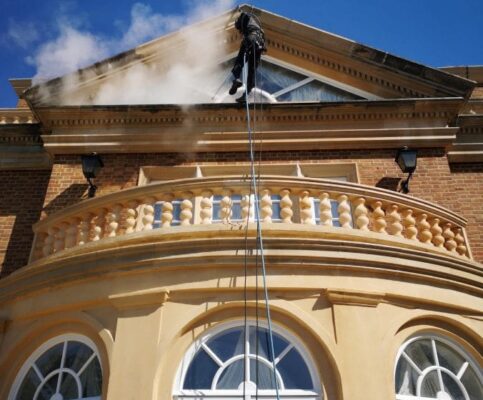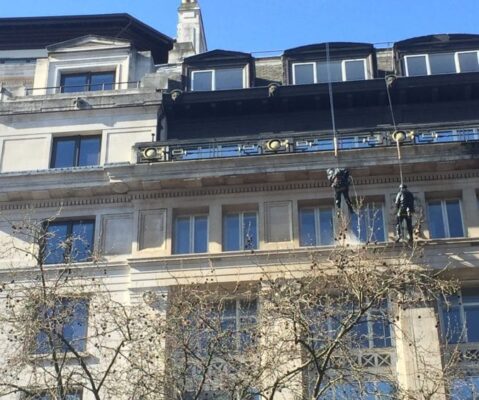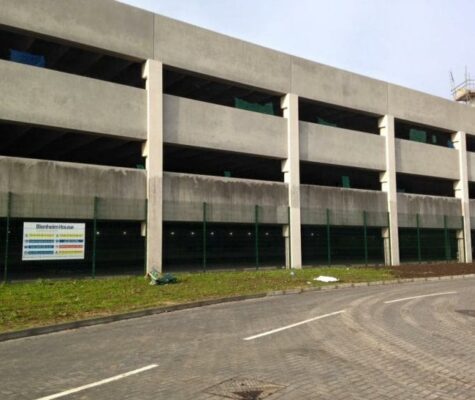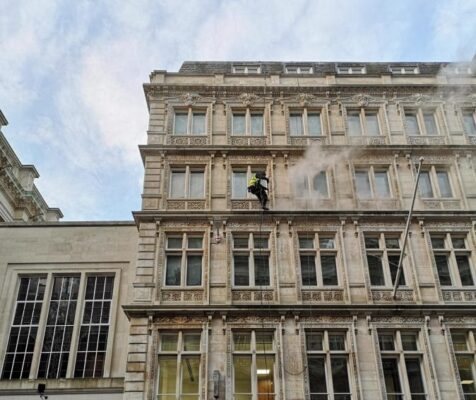View More SErvices Contact Us
Facade Cleaning in Chelsea
Cleaning building facades from top to bottom, no matter how tall your building.
Natural stone facade cleaning in Chelsea can be accessed and cleaned efficiently and effectively by using rope access methods. Using this method, the need for local authority permits is totally eradicated, allowing works to proceed immediately. Using professional stone cleaning equipment we can roll back the years to make your building look like new.
Brick cleaning
Brick buildings become dirty as much as any other building. We will not only clean away the dirt and grime, we can revitalise the colour. Using a range of bio-degradable chemicals, we can restore the colour of red or yellow bricks.
Contact UsGlass facade cleaning in Chelsea
Glass facade cleaning in Chelsea takes place by abseilers using traditional window cleaning tools. External windows, internal atriums, after builders cleaning or regular maintenance cleans, our abseilers are experienced in all manner of glass cleaning.
Contact UsAluminium cladding cleaning
Aluminium cladding in Chelsea can become extremely dirty over time. Warehouses that have many lorries coming and going will become soiled with traffic film. Using our steam cleaning systems, this grime is washed away leaving a lasting first impression for your visitors.
Contact UsOur services
Rope Access Facade Cleaning Services for Chelsea And Surrounding Counties

Residential property Stone Facade Cleaning
Façade cleaning at this residential property in Chelsea, which was not of any great height but, had no access for other forms of access equipment. Abseiling was the solution and the results were outstanding.

Stone Steam Cleaning in London
This beautiful natural stone building was looking tired from the day to day London traffic. Rope access was seen as the most cost-effective method of access.

Concrete Facade Cleaning in Chelsea
This car park in Essex was filthy. It hadn’t been cleaned, ever. As the access to three elevations was extremely tight, abseiling was the only method that could achieve the results.

Facade Cleaning in Chelsea
A new acquisition for our client needed a freshen up. Out of hours abseiling was the best way to clean this building in the heart of the City of London.
Brick colour restoration
Before colour restoration
This client requested a test patch before assigning us the job of cleaning their building. We carried this out with amazing results.
After colour restoration
These are the pictures of the test patch that we sent to the client. Her reaction was simply ‘WOW’. That’s the perfect response for us.
Torik Stone Cleaning System Features
150 degrees centigrade steam cleaning power
Provides a continues flow of superheated water to penetrate stone and deep clean, removing organic growth & ground in dirt.
We use Tensid (uk) Ltd
Providers of specialist cleaning equipment and specialist cleaning chemicals to professionals.
Get In Touch
Fill in the form below and we’ll be in touch within 24hrs of receiving your message.
Facts About Chelsea
Chelsea History
Chelsea hosted the Synod of Chelsea in 787 AD. The first record of the Manor of Chelsea precedes the Domesday Book and records the fact that Thurstan, governor of the King’s Palace during the reign of Edward the Confessor (1042–1066), gave the land to the Abbot and Convent of Westminster. Abbot Gervace subsequently assigned the manor to his mother, and it passed into private ownership.
King Henry VIII acquired the manor of Chelsea from Lord Sandys in 1536; Chelsea Manor Street is still extant. Two of King Henry’s wives, Catherine Parr and Anne of Cleves, lived in the Manor House; Princess Elizabeth – the future Queen Elizabeth I – resided there, and Thomas More lived more or less next door at Beaufort House. In 1609 James I established a theological college, “King James’s College at Chelsey” on the site of the future Royal Hospital Chelsea, which Charles II founded in 1682.
General Info
Chelsea is an area of South West London, bounded to the south by the River Thames. Its river frontage runs from Chelsea Bridge along the Chelsea Embankment, Cheyne Walk, Lots Road, and Chelsea Harbour. Its eastern boundary was once defined by the River Westbourne, which is now in a pipe above Sloane Square Underground station. The modern eastern boundary is Chelsea Bridge Road and the lower half of Sloane Street, including Sloane Square.
The district lies entirely within the Royal Borough of Kensington and Chelsea, although Chelsea gives its name to nearby locations, such as Chelsea Harbour in the London Borough of Hammersmith and Fulham, and Chelsea Barracks in the City of Westminster. From 1900, and until the creation of Greater London in 1965, it formed the Metropolitan Borough of Chelsea in the County of London.



